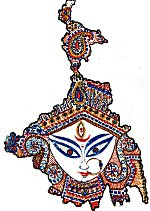West Bengal
Introduction
Indian statesman Gopalakrishna Gokhale once said -- "..what Bengal thinks today, India thinks tomorrow!" This is true in more ways than one; the Bengalis have led India in many fronts. It was division of Bengal in 1905 that started India's freedom struggle and another in 1947 terminated it. Philosophers such as Arabindo, and Swami Vivekananda have influenced Indian thought and ways of life. Bengali geniuses have enriched Indian literature, science and arts. Bengal is the the epitome of India's values and heritage as it is of India's problems and aspirations. Social revolutions like Naxal and Communism first took roots in India here, so did their problems they caused. A land of extreme poverty and pollution, what makes Bengal still thrive? What makes India thrive ?
We bring you this online exhibition of articles, pictures
and history on ämär sonär Bänglä. This is not a tourist
information brochure; we have tried to represent the rich and complex
tapestry of life in Bengal as experienced by the authors during late 60s
and again in early 80s. -- Ed.
The logo, cartoons, stories and photographs by K.L.
Kamat.
Page Last updated on : December 07, 2024
Link to Ful Text of Vangadarshana -- Kannada book by Krishnanand Kamat
Table of Contents
- A brief history of West Bengal
- A map of West Bengal
- Oh! Calcutta!! -- K. L. Kamat goes to Calcutta
- Banga-Ranga -- Bengali theater scene by Jyotsna Kamat
- Temples of West Bengal
- "Kansa was a Naxalite!" -- interview with a wise boy, Mayapur
- Living with the poor -- A letter from Plassey
- Red Ants and the Santali Boy
- Bengali Potpourri -- Search for Pictures of Bengal in Kamat PictureSearch
West Bengal in Pictures
- "When you destroy the old, a new era begins" - Mao-Tse-Tung
- A drummer of the Santhal tribe, West Bengal
- A Bride Offers Prayers
- A Map of West Bengal
- A Potter at Work, Plassey
- A refugee from Bangladesh, West Bengal, 1969
- A Scene from Bengali Theater, 1980
- A Terra Cota Relief from a Temple in Bengal
- A Weaver at Sriniketan Campus
- Advertisement of a Bengali Magician/Fortune Teller
- Bengal Tiger
- Bengal Tiger in Mysore Zoo
- Bengali Street Play
- Bengali Theater
- Bengali Villager
- Bengalis just love fish
- Bicycle Rickshaw, Plassey in Bengal
- Boating is the Cheapest Mode of Transportation
- Boy Artist Sculpting a Statue of Bose
- Boy riding water buffalo to work, West Bengal
- Boys Playing in Rural Bengal
- Charudatta and Vasantasena
- Chhau Dance -- Masked Dance of Bengal
- Dance, Music and Song in Bengal
- Decoration Outside a Rural Hut
- Folk Dancer from Bengal Performing the Chhau Dance
- Girl paints Alpana in front of the door, Calcutta
- Image of Goddess Kali
- In the land of Paramahamsa & Tagore, Mao also has a great presence
- Jute Fiber Being Transported in Bufallo Cart
- Kali is a Popular Deity in Bengal
- Kamat Fits Goddess Kali in a Map of Bengal
- Maoist and Naxalite Graffiti
- Mask of a Chhau Folk Dancer
- Masked Chhau Folk Dancer from West Bengal
- Men Celebrating During a Village Festival, Plassey
- Musical Instrument Maker
- Offering Prayers with Music, West Bengal
- Overcrowded Vehicle Carrying Men and Cargo
- Picture of Writer Ashapurna Devi
- Plassey war memorial, Plassey, West Bengal
- Punishment for favoring the British
- Rani Rashmoni (1793 - 1861)
- Ready for Harvest
- Rural West Bengal
- Sailing in Bhagirati River
- Santali Drummer, West Bengal
- Santhal Tribal Habitat, Bengal
- Sarat Chandra Bose (1889-1950)
- Scene from Mrichakatika
- Shambhu Mitra, a great Bengali playwright in 1980
- Temple, Man, Cow - West Bengal
- Terracotta Sculptures of West Bengal
- The Bengal Tiger
- The Raga of Bengal
- The Village of Plassey
- This is not Kremlin! - Mayapur, West Bengal
- Woman Quenches the Thirst of Two Bullocks
See Related Topics at Kamat's Potpourri
- Poet Laureate Rabindranath Tagore
- Subhas Chandra Bose -- a man ahead of his time...
- Nandalal Bose -- A well respected artist from Bengal
- Rajaram Mohan Roy -- father of modern India
- India's Greatest Historian -- Interview with Prof. R.C. Majumbar
- Picture of Swami Vivekananda

